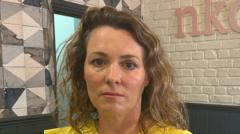Is the Salon Owner Prepared for the Crucial L'Oréal Dispute Hearing?

Overview of the Trademark Dispute Between L'Oréal and Rebecca Dowdeswell
The ongoing trademark dispute between Rebecca Dowdeswell, the owner of the Leicester-based salon named nkd, and the global cosmetics giant L'Oréal has captured considerable attention. This case revolves around the renewal of Dowdeswell's trademark, which L'Oréal has opposed due to potential consumer confusion with its own Naked beauty product line. As the hearing date approaches, Dowdeswell expresses newfound confidence in her position, ready to challenge L'Oréal once again. This article delves into the complexities of the trademark dispute, the implications for small businesses, and the ongoing impact of Brexit on trademark registrations.
The Origins of the Trademark Dispute
Rebecca Dowdeswell established her salon, nkd, and secured the trademark name in 2009. Unfortunately, the trademark expired in 2019, and Dowdeswell faced the challenging task of re-registering it in 2022. Like many small business owners, she found herself overwhelmed by the COVID-19 pandemic, leading to the unfortunate oversight of missing the trademark renewal deadline. This situation highlights the challenges faced by small business owners during unprecedented times.
Understanding Trademark Law
Trademark law is designed to protect brands and prevent consumer confusion in the marketplace. A trademark is a recognizable sign, design, or expression that identifies products or services of a particular source. In this case, L'Oréal holds a trademark for the Naked brand, which includes various beauty products, including the Urban Decay Naked eyeshadow palettes. L'Oréal argues that Dowdeswell’s nkd trademark may confuse consumers, potentially harming its brand reputation.
Impact of Brexit on Trademark Registrations
Brexit has introduced significant changes to trademark registrations in the United Kingdom. Before Brexit, businesses could register trademarks with the European Union (EU) or the UK. However, the transition has resulted in a substantial backlog of trademark applications and renewals, with the Intellectual Property Office (IPO) citing a "very significant" caseload. The transfer of approximately 1.4 million EU trademarks to the UK has compounded the issue, leading to delays in hearings and decisions.
The Role of the Intellectual Property Office
The IPO is responsible for overseeing trademark registrations and disputes in the UK. In this case, the IPO has acknowledged the delays in the hearing process and attributed them to the increased workload following Brexit. Dowdeswell's hearing, now scheduled for November 5, will be a pivotal moment for her business and her trademark rights.
The Emotional Toll of Trademark Disputes
For Dowdeswell, the trademark dispute has not only been a legal battle but also an emotionally taxing experience. She has publicly shared the stress and anxiety that have accompanied this process, particularly as a mother of two young children. The competition against a global giant like L'Oréal has taken its toll, yet Dowdeswell remains resolute in her commitment to her brand and her business.
Financial Implications of Legal Battles
The cost of defending her trademark has been substantial for Dowdeswell, amounting to over £30,000. This financial strain is common for small business owners embroiled in legal disputes with larger corporations. The disparity in resources often leaves small businesses at a disadvantage, raising questions about the fairness of trademark law and the ability of smaller entities to compete in the marketplace.
Consumer Confusion: A Key Argument
One of the central arguments in L'Oréal's opposition to Dowdeswell's trademark is the claim of consumer confusion. L'Oréal asserts that the similarity between nkd and Naked could mislead consumers regarding the source of beauty products. However, Dowdeswell countered this claim by stating that, in her 15 years of operation, she has never encountered any consumer inquiries that suggested confusion between her brand and L'Oréal's Naked products.
Addressing Consumer Confusion in Trademark Law
Consumer confusion is a critical factor in trademark disputes. Courts often assess the likelihood of confusion based on several criteria, including the similarity of the marks, the nature of the goods, and the channels of trade. In Dowdeswell's case, her salon specializes in personal beauty services, while L'Oréal's Naked products are cosmetics. This distinction may play a significant role in the IPO's decision-making process.
The Path Forward: What Lies Ahead?
As the hearing date approaches, both parties prepare for what could be a game-changing decision. Dowdeswell has expressed a renewed determination to fight for her brand, emphasizing that she will not back down in the face of opposition from L'Oréal. The outcome of this case may have broader implications for trademark law, particularly regarding the rights of small businesses against larger corporations.
Potential Outcomes of the Hearing
The IPO's decision could result in one of three outcomes:
- Dowdeswell Wins: If the IPO rules in favor of Dowdeswell, she will retain her nkd trademark, allowing her to continue operating under the brand without interference from L'Oréal.
- L'Oréal Wins: A ruling in favor of L'Oréal would prevent Dowdeswell from using the nkd name, forcing her to rebrand her business, which could have serious financial implications.
- Settlement: There is also the possibility of a settlement where both parties agree to coexist, potentially allowing Dowdeswell to use her trademark under specific conditions.
Conclusion: The Importance of Trademark Protection for Small Businesses
This case serves as a reminder of the importance of trademark protection for small businesses. It underscores the need for entrepreneurs to be vigilant about their intellectual property rights, especially during tumultuous times like the pandemic. Dowdeswell's determination to fight for her brand exemplifies the resilience of small business owners in the face of adversity.
FAQs About Trademark Disputes
What is a trademark dispute?
A trademark dispute occurs when one party claims that another party's use of a trademark infringes upon their own trademark rights, potentially causing consumer confusion or harming their brand reputation.
How can a small business protect its trademark?
Small businesses can protect their trademarks by registering them with the appropriate intellectual property office, monitoring for potential infringements, and taking legal action if necessary.
What are the potential outcomes of a trademark hearing?
Outcomes of a trademark hearing can include a ruling in favor of one party, allowing them to retain their trademark, a ruling against one party, requiring them to stop using the trademark, or a settlement agreement between both parties.
As Rebecca Dowdeswell prepares for her hearing, the broader implications of her case resonate within the business community. Will this dispute redefine the landscape of trademark law for small businesses, or will larger corporations continue to hold the upper hand? The outcome remains uncertain, but what is clear is that the fight for identity and brand protection is far from over. #TrademarkDispute #SmallBusiness #IntellectualProperty
```Published: 2025-07-26 01:07:13 | Category: technology



